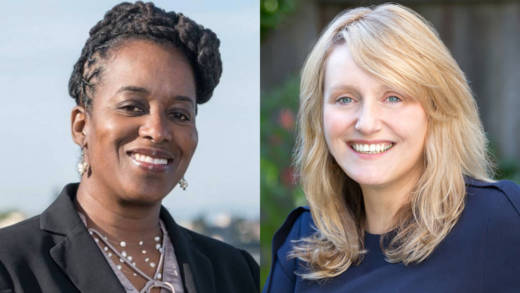Will these national players get involved with endorsements or even ads in a local Assembly race? Don't rule it out.
Wicks was not only an early staffer on Obama's 2008 campaign, she also worked inside the White House to push for the passage of the Affordable Care Act. And Sanders has come to the district to endorse Beckles before (in her 2014 run for City Council) and in recent years has endorsed other progressive candidates for the state Legislature.
Neither candidate seems anxious to make this race a proxy war in the interminable Clinton vs. Sanders debate, and it's not clear who would be advantaged by that dynamic. In the 2016 Democratic primary, Clinton edged Sanders in Assembly District 15 by less than 1 percentage point, 50.2 to 49.4.
A Focus on Housing
In the crowded primary, the 12 candidates prioritized voter outreach and turnout over drawing policy differences with the other contenders.
That will likely change with the field down to two.
With skyrocketing rents and home prices in the Bay Area, it's no surprise that both campaigns are focused on housing. Neither candidate voiced complete support for Senate Bill 827, which would have forced cities to allow more dense developments around transit, but Wicks was more supportive than Beckles of the idea of giving the state more control over zoning in order to spur construction.
The debate over rent control is more likely to be on voters' minds this summer, with a measure to repeal the state ban on expanding rent stabilization on the November ballot. Beckles supports that measure to repeal the Costa-Hawkins Rental Housing Act, while Wicks prefers reforms to the law, including the idea of stabilizing rents on units when they reach a certain age.
The two are also divided on how to regulate charter schools, a lightning-rod issue in Oakland. Beckles has advocated for a statewide moratorium on new charter schools. Wicks supports efforts to make charter school organizations more transparent, but says the process of approving charter applications should be left to local school districts.
Can Beckles Compete with Wicks' Fundraising?
Wicks' tremendous fundraising helped her gain name identification in a primary field where six of her opponents had already appeared on a local ballot before. By raising more than $650,000 in the primary, Wicks was able to get her name out through mailers, television ads and phone banking, buttressing a busy schedule of canvassing and house parties.
Beckles raised less than all the other leading candidates in the primary, relying mostly on small donations. To be competitive in the general election, she will have to continue to dominate local fundraising: An analysis of primary donations finds 72 percent of contributions to Beckles came from ZIP codes within the district, compared to just 13 percent of donations to Wicks.
Where Will the Outside Spending Come From?
In addition to leading the field in campaign fundraising, Wicks was the biggest beneficiary of independent expenditure spending in the primary. By law, these groups (also known as Super PACs) are not allowed to coordinate with campaigns or directly give money to candidates.
The largest independent supporter of Wicks was the group Govern for California, which advocates for issues including pension reform, changes to teacher tenure rules and increasing the state's housing supply. The former two positions have drawn the ire of Wicks' opponents, and led her to defend her record on education policy.
Consultants often say that the first rule of independent expenditure campaigns is "do no harm" to the candidate or cause you're trying to help. It's possible that support from Govern for California could become a liability for Wicks if their campaign continues to be a lightning rod for her opponents.
It remains to be seen if any outside spending (particularly from labor unions) coalesces around Beckles. She did not have any registered Super PAC support during the primary, although an outside group called Blue America PAC paid for a Facebook ad that promoted Beckles and criticized Wicks. The ad was removed by Facebook for not meeting the platform's new reporting requirements for political content.
Winning Over Primary Opponents
It's no surprise that a primary packed with 12 candidates led to a split among many interest groups and officeholders involved in East Bay politics. It will be vital for Beckles to consolidate the support of both organized labor, which was fractured in the primary, and the candidates who positioned themselves to the left of Wicks.
Also undecided are the two Congress members representing most of the district, Barbara Lee and Mark DeSaulnier, who are both currently weighing which candidate they'll support in November.

